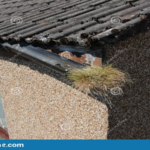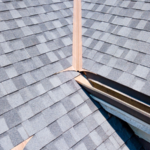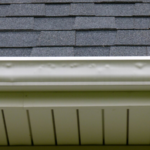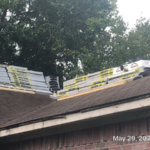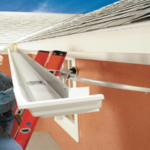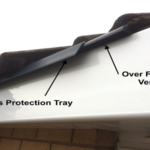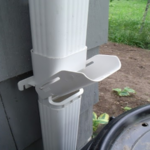Gutters are an important part of any home, as they help to protect the foundation and landscaping from water damage. However, gutters can wear out over time and will eventually need to be replaced. The lifespan of gutters depends on a number of factors, such as the material they are made from, the location of the house, and the amount of maintenance they receive.
Gutters made from aluminum or vinyl are usually the longest lasting, with a lifespan of 20-30 years. Gutters made from wood or other materials may only last for 10-15 years. The location of the house also affects the lifespan of gutters, as those in more humid or rainy climates will experience more wear and tear. Proper maintenance is also crucial to extending the life of gutters, as regularly cleaning them and repairing any leaks or damage can help prevent more serious problems down the road.
In general, gutters will last for 10-30 years, depending on the material, location, and maintenance. Those made from aluminum or vinyl will usually last on the longer end of that spectrum, while those made from wood or other materials may need to be replaced more frequently. Proper maintenance is key to prolonging the life of gutters, so be sure to regularly clean them and repair any damage to help them last as long as possible.
How often should you replace house gutters?
Your gutters play an important role in protecting your home from water damage. They channel water away from your roof and foundation, and prevent rainwater from seeping into your home. Over time, gutters can become clogged with leaves and debris, which can cause them to become damaged or ineffective. It’s important to inspect your gutters regularly and clean them out as needed. You should also replace your gutters every few years to ensure they remain in good condition.
How do you know when you need new gutters?
- One of the main indicators that you need new gutters is if your current ones are sagging or pulling away from your home.
- Another sign is if you notice water damage around your home, particularly near the gutters or in the basement.
- If your gutters are constantly leaking, it’s time for new ones.
- If you have to constantly clean out your gutters, that’s a sign they aren’t doing their job properly.
- finally, if you see any cracks or holes in your gutters, that’s a sign they need to be replaced.
What is the most common problem with gutters?
The most common problem with gutters is that they can become clogged with leaves, twigs, and other debris. If the gutters are not cleaned out on a regular basis, this can cause water to back up and spill over the edge of the gutters, onto the ground or even into the home.
Should you replace gutters or roof first?
This is a difficult question to answer without knowing more about the specific situation. In general, however, if the gutters are in bad shape and need to be replaced, it is probably best to do that before replacing the roof. This is because the gutters play an important role in protecting the roof from water damage, and if they are not in good condition, the roof is more likely to be damaged.
Which is better vinyl or aluminum gutters?
There is no definitive answer to this question as it depends on a variety of factors. Some people prefer vinyl gutters because they are less expensive and easier to install than aluminum gutters. Others prefer aluminum gutters because they are more durable and offer more color options. Ultimately, the best gutters for your home will depend on your budget, the climate in your area, and your personal preferences.
How do you know if your gutters are bad?
- Your gutters are sagging or pulling away from your home.
- You see cracks or holes in your gutters.
- Water is leaking from your gutters.
- Your gutters are full of debris.
- Your home is experiencing water damage.
If you notice any of these signs, it’s time to call a professional to replace your gutters. Don’t wait to replace your gutters, as this can lead to more serious damage to your home.
Why don t new homes have gutters?
There are a few reasons for this. One reason is that new homes are built with a lot of extra care taken to avoid water damage. Gutters can actually cause more water damage than they prevent if they are not installed properly, so many builders prefer to just avoid them altogether.
Another reason is that many new homes are built with rain barrels or other water catchment systems in place. These systems can be just as effective as gutters at preventing water damage, but they are often cheaper and easier to install.
Finally, some people simply prefer the look of a home without gutters. Many modern home designs incorporate features that help redirect rainwater away from the foundation, so gutters are not really necessary.
How long does it take to put new gutters on a house?
It usually takes around two days to put new gutters on a house. The first day is spent removing the old gutters and preparing the house for the new ones. The second day is spent installing the new gutters and making sure they are properly secured.
Do new gutters add value to a home?
Adding gutters to a home can most definitely add value! Not only does it add to the curb appeal, but it can also save the home from future water damage. When it comes to selling a home, potential buyers are always looking for any added bonuses, and gutters can be a great selling point.
Final Word
There is no one definitive answer to this question as gutters can last anywhere from 10 to 30 years depending on the material and how well they are maintained. However, on average, most gutters will need to be replaced every 15 to 20 years.

